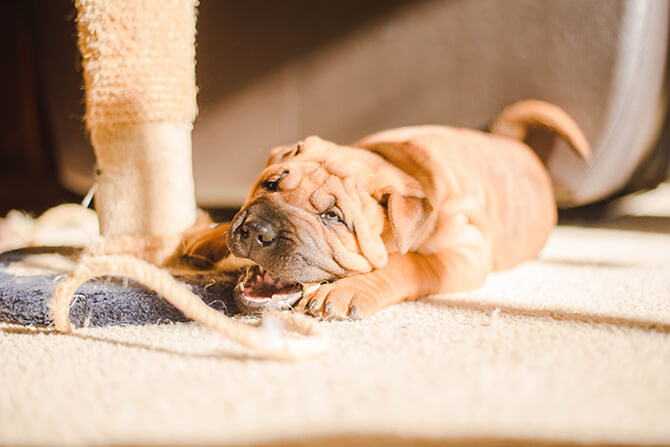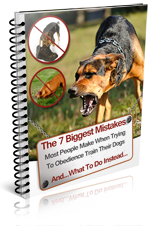Dogs will always chew. Some breeds are certainly more predisposed towards chewing than others - especially breeds that have long been used in pursuits requiring the use of their mouths. These breeds include hunting dogs, like Retrievers, spaniels and hounds; but a basic truth is that for most dogs, chewing is a pastime (similar to how humans read or watch TV - dogs chew for pleasure and to pass time when bored).
For many owners, their dog's chewing has passed the point of a harmless pastime, and has become a serious nuisance. Human furnishings and possessions are not built to withstand the onslaught of chewing and gnawing that the average dog can deal out; furniture, clothing, electrical wiring, even whiteware can be ruined in under ten minutes. Different dogs also have different tastes: some will go for the items which most resemble their natural foodstuffs in the wild (for example, leather shoes and belts) whereas others head straight for the drywall and start gnawing.
Listed below are some basic tips for preventing and handling the urge to chew in your dog.
Protect Your Furniture
Boredom is a primary cause of chewing in most dogs. Is your dog left to his own devices a great deal? Even dogs that aren't prone to separation anxiety find it pretty hard to have nothing to do all day, day after day. Even a dog that has the full run of the yard can get hideously bored - which is where chewing comes in. A welcome diversion, chewing gives a bored and lonely dog something to do, and makes him feel like he has a task to complete. This is pretty sad when you think about it - your dog relies on you for companionship and mental and physical stimulation. If he's chewing destructively on a regular basis, this is a pretty reliable sign that you're not doing enough to keep him happy and content.
To keep your dog content, he needs mental stimulation. If you work all day, or your schedule requires that you leave your dog on his own for long periods of time (a long time is anything more than two hours, especially on a regular basis), consider getting someone in to play with him and take him for walks during the day: a trusted neighbor or friend will do the trick nicely, but there are also dog-walking and dog-sitting services. Another alternative is to take your dog to doggie day-care (like a child-care center) where your dog will be looked after and played with all day by trained professionals. He'll have lots of other dogs to play with and interesting toys and activities to occupy his time; this is by far the best option, although it does cost more.
Dogs need sufficient exercise. Depending on the breed, your dog will need anything from a brisk 20 minute walk to several hours of vigorous cardiovascular exercise every day (the only exception to this rule is the more lethargic breeds, such as the English bulldog, a lot of pugs, and some toy breeds). Make sure you're meeting these exercise requirements, as an excess of energy is a leading cause of destructive chewing.
Your dog has a mind, too! All dogs get bored. Some handle it more phlegmatically than others, suffering in silence during long boring days by themselves; most breeds, particularly working breeds (which tend to have a strong need for a 'job' to do) like Border Collies, Retrievers, Rottweilers, and German Shepherds, will quickly become frustrated by a blank itinerary each day and will express this by chewing, digging, and barking. If you provide your dog with a stimulating, interesting vent for his mental capacities - particularly if it seems like a 'job' for him to do - he'll chew less, but (and this is at least as important) he will be a lot happier. There are some great brain-stimulating games and puzzles out there; go down to your vet's, the pet store, and even your supermarket to check them out.
Here are some basic ways to prevent your dog from chewing:
- 1. Limit his space. This should be your first tactic. Confine your dog to a particular room while you are out and make sure that there is nothing that he can destroy. Please do NOT lock him into a crate all day; it's very hard on your dog not being able to move around, or have anything to occupy his time. Another option is to give him a dog run in your backyard. Loop his leash around your clothesline so that he can move up and down the length of the line. Be sure to take any laundry off the line beforehand!
- Fence Your Garden. A partial solution to the problem is to allow your dog full access to the garden while you're out. You will need a high, strong fence; if your dog is an escape-artist or likes to dig, sink wire into the ground underneath to discourage tunnelling.
- 2. Reprimand Your Dog. If you catch your dog chewing your property, rebuke him on the spot. Don't wait until after he has committed the crime; a dog that is reprimanded even minutes after the mischief has occurred will not understand what he is being punished for. Dogs don't have any concept of time, so unless you actually catch him in the act, a telling-off from you will just confuse your dog and make him unnecessarily unhappy. Make sure that if you reprimand your dog for chewing furniture, you do it while he's actually chewing it.
- 3. Set an ambush.If your dog usually chews forbidden items when you're not around, try setting him up (this may sound cruel or unnecessary, but you have to bust him while he's doing it in order for corrections to make any sense). Let him walk around and sniff about for a few minutes without interfering or paying him any attention; if possible, you can leave the room (but make sure you can still see him). Dogs have an acute sense of being watched, so you can pretend to occupy yourself by reading the paper, doing some cleaning, etc. As soon as his jaws close around an inappropriate item, swoop down on him with a loud, scary "Ah-ah-AAAAAHH!" (this is a more distinctive and startling sound to dogs than "no", because of the pitch of your voice. Loud, piercing, higher-pitched utterances will do more than a low and growly noise). As soon as he drops the item, substitute quickly with an appropriate toy: and AS SOON AS he takes it into his mouth, praise him exaggeratedly and give him lots of petting and encouragement. After you've repeated this process a few times, he'll get the hang of it.
- 4. Make Toys Tempting. Make the items you WANT your dog to chew, such as his toys, much more desirable than the furniture! Spray toys and chews with a small amount of cooking oil and garlic salt, as dogs love those particular tastes. Spray the oil and sprinkle the salt onto his toys before leaving him alone in the house.
- Furniture Tastes Bad Apply foul-tasting substances (non-toxic, of course) to trouble areas: cayenne pepper or Tabasco sauce will do (but may stain, so only use on appropriate washable surfaces). There are also a number of specific anti-chew salves, sprays and creams (Bitter Apple is excellent) which are purchasable from your pet store and supermarket; these are generally more efficient at deterring chewing.
- 6. Counteract loneliness. Boredom and loneliness are the two main causes of destructive behavior like chewing, digging, and excess barking. You can try leaving a radio or TV on (not too loudly); make sure that it's tuned to a show featuring people talking (so no action movies or loud aggressive rock). The idea is to make your dog feel like he's got company in the house.
For more in-depth information on treating problematic behavior in your dog, as well as a wealth of information on training, games, and dog psychology and communication, check out Secrets to Dog Training: a training manual written by an experienced dog-trainer.
You can Download Secrets to Dog Training From http://dogobedienceadvice.com/sitstay


